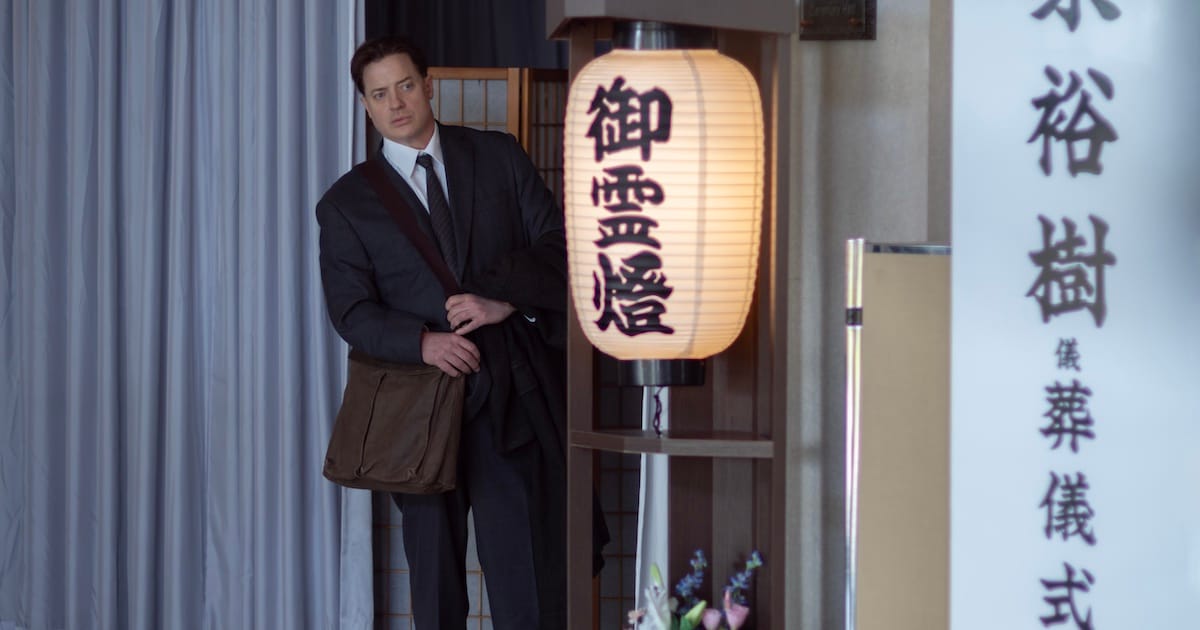Searchlight’s cross-cultural dramedy, Rental Family, turns a fascinating premise into manipulative mush.
When Rental Family opened at the Denver Film Festival’s Holiday Theater on November 1, the audience was ready for another heartwarming Brendan Fraser comeback. Instead, they got a schmaltzy, ideologically inconsistent lecture disguised as a comedy-drama.
Directed by Hikari and co-written with Stephen Blahut, the film turns the bizarrely real Japanese phenomenon of rental families, which are companies that let clients hire actors to play stand-in loved ones, into a glossy, tone-deaf melodrama. It’s the cinematic equivalent of putting sparkle on shit.
A hollow heart beneath the charm
Fraser stars as Phillip Vandarploeug, a washed-up American actor who moved to Tokyo to star in a toothpaste commercial and has since been floundering. Phillip stumbles into a role at a rental family agency run by Shinji (Takehiro Hira). Soon he’s impersonating everything from a mourner at a funeral to the long-lost father of a lonely girl, Mia (Shannon Mahina Gorman).
The premise could have been a haunting study of alienation, performance and what it means to sell emotion for survival, but Rental Family treats it like an inspirational parable about connection. The marketing promises “the joy of unexpected connections,” yet what unfolds is a story about a company that profits from deceit and emotional dependency.
The film’s problem isn’t just that it refuses to condemn this deception; it can’t decide whether lying is poisonous or profound. One scene captures that muddle perfectly: Phillip hires a sex worker and ends up having a painfully literal conversation about his moral crisis and how he is basically an emotional prostitute for his clients. The scene lands with a thud, spelling out the film’s metaphor so bluntly it erases any nuance it might have had.
Hikari directs this moral confusion with the soft glow of sincerity, as if sentiment could sand down the ethical rough edges. Characters deliver their feelings in neat, expository speeches. For example, near the end, Philip solemnly declares, “Lying is easier than telling the truth,” which explains why he and other adults deceived Mia, and the film then affirms the power of truth-telling.
But nothing that follows meaningfully upholds that claim. By the end, the rental family business carries on with minor tweaks, everyone hugs and the movie congratulates itself for finding humanity in hypocrisy. It’s a hollow conclusion to a story that keeps insisting it’s about honesty.
Flat filmmaking, flatter characters
Visually, Rental Family looks like it was assembled from stock footage and soft lighting presets. Cinematographer Takurô Ishizaka’s shots of Tokyo, including crowds, trains and bright neon signs, feel more like screensavers than a lived-in world.
The film’s portrayal of Japan feels disappointingly shallow. Though it’s set and shot there, the culture functions mostly as a backdrop for Phillip’s personal awakening rather than as a living, breathing context of its own.
When the script does attempt to explain Japanese customs or social dynamics, like a scene where a character flatly announces, “mental health is stigmatized here,” it plays less like genuine observation and more like a guided-tour summary for Western audiences. The result is a setting that feels decorative rather than immersive, more concerned with surface understanding than emotional or cultural truth.
Fraser gives a performance as labored as the film’s pacing. His Phillip is supposed to be lost and lonely, but the melancholy feels forced, drenched in sentiment rather than rooted in truth. The supporting cast fares no better. Mari Yamamoto’s Aiko, one of the agency’s employees, hints at deeper disillusionment with the job and even gets one fleeting moment of rebellion late in the film, but the film quickly sweeps it aside in favor of easy catharsis.
Every character is flattened into a moral symbol: the cynic, the innocent, the surrogate father and the elder (played by Akira Emoto), and, as a result, none of it feels real.
Manipulation masquerading as meaning
The most stomach-turning thread involves Phillip’s faux-father relationship with Mia, which races from awkward to implausibly tender in record time. Their connection, built on deceit, should raise ethical red flags, but the film treats it as cute rather than creepy.
When Mia eventually learns the truth, her disappointment barely registers before we’re rushed to a feel-good finale, implying they’ll continue their “real” relationship. It’s meant to be redemptive, but it plays as deeply irresponsible.
Moments of tonal relief do exist, including a brief comic set piece in which rental family employees don undercover disguises to clear Phillip’s name, which elicits genuine laughs, but those flashes of playfulness only underscore how stifled the rest of the film feels. Hikari seems afraid to let the story breathe, smothering its inherent strangeness beneath swelling strings and moral monologues.
Rental Family wants to be profound, but it’s too enamored with its own sentimentality to say anything meaningful about loneliness, performing emotional labor or cross-cultural identity. The premise has been explored before, notably in Werner Herzog’s 2019 Family Romance, LLC, which found genuine existential dread in the same concept, but Hikari’s version trades that complexity for cliché.
When the credits rolled at the packed Holiday Theater screening, a few sniffles echoed through the crowd. But for me, no amount of tearful music could disguise what Rental Family really is: a shallow drama dressing up exploitation as enlightenment.
A Colorado-based arts reporter originally from Mineola, Texas, who writes about the changing world of theater and culture, with a focus on the financial realities of art production, emerging forms and arts leadership. He’s the Managing Editor of Bucket List Community Cafe, a contributor to Denver Westword and Estes Valley Voice, resident storyteller for the Bonfils-Stanton Foundation and co-host of the OnStage Colorado Podcast. He holds an MBA and an MA in Theatre & Performance Studies from CU Boulder, and his reporting and reviews combine business and artistic expertise.





Leave A Comment